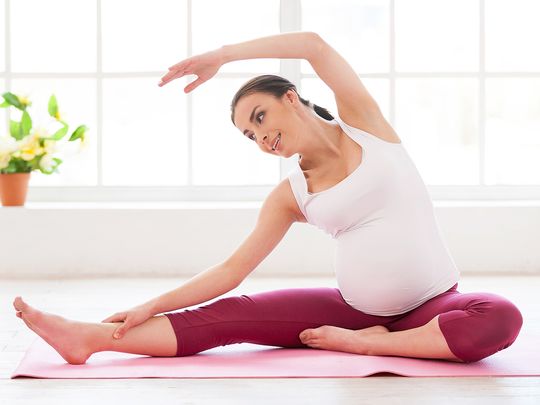Fitness is essential during pregnancy as it helps regulate blood pressure levels and alleviates emotional exhaustion and fatigue. The journey of pregnancy is a mix of wonder and challenges, with backaches, fatigue, and health concerns often leaving one drained. Low-resistance training emerges as a powerful tool to combat these issues effectively.
According to Nora Hameidani, the founder of Barre Effect in Dubai, low-resistance training acts as a natural mood enhancer, reducing stress levels, boosting mood, and maintaining physical strength. It safeguards the body from injuries, supports healthy weight management, and promotes better sleep. This regimen plays a pivotal role in enhancing the mother’s physical well-being, comfort, and energy levels during pregnancy.
Sarah Lindsay, co-founder of Roar Fitness in Dubai, emphasizes the importance of focusing on strength rather than fixating on weight. She advises pregnant individuals to maintain their existing fitness routines, ensuring that they are conditioned for the activities they engage in. While it may be necessary to adjust the intensity of workouts due to bodily changes, staying strong is key to easing the pregnancy journey, childbirth process, and postpartum recovery.
During pregnancy, opting for low-resistance training such as swimming, yoga, or pilates is recommended to reduce joint strain and minimize the risk of injuries. These exercises can help combat fatigue, enhance muscle strength and endurance, and prepare the body for the demands of labor and delivery. Additionally, engaging in regular physical activity can elevate mood, alleviate depression symptoms, regulate blood pressure, and alleviate back pain commonly experienced during pregnancy.
It is crucial to consult healthcare providers for guidance on suitable exercises tailored to different stages of pregnancy. Maintaining an active lifestyle, even through simple activities like daily walks or swimming, can significantly benefit both physical and mental well-being. While exercising, it is essential to be mindful of individual limits, avoid comparing oneself to others, and prioritize safety by choosing low-impact activities that support the body’s changing needs.
Incorporating mild aerobics and yoga into the fitness routine can further enhance muscle tone, cardiovascular health, and flexibility. However, pregnant individuals should avoid high-risk activities like contact sports, skiing, or horseback riding to prevent potential harm. Yoga, in particular, offers various benefits such as muscle strengthening, improved blood circulation, healthy blood pressure maintenance, and increased flexibility, making it a valuable addition to a prenatal fitness regimen.
As pregnancy progresses, modifications in exercise routines may be necessary to ensure safety and comfort. It is essential to avoid poses that involve lying on the abdomen or back, as these positions can restrict blood flow and lead to dizziness. Starting workouts gradually, maintaining balance and stability, and staying hydrated are crucial considerations to prevent overheating and dizziness during exercise sessions.
To optimize the benefits of prenatal fitness, individuals should be cautious about workout environments, avoid exercises that strain the abdomen, and prioritize hydration and temperature control. By following expert advice, pregnant individuals can navigate their fitness journey effectively, promoting overall well-being for themselves and their growing baby.

